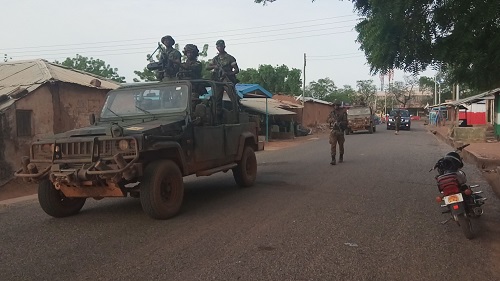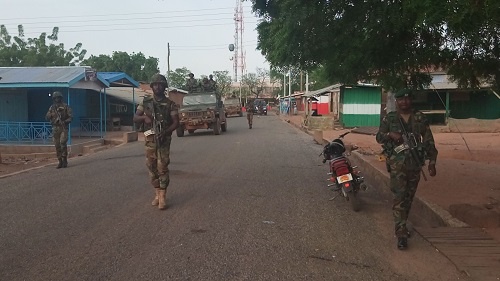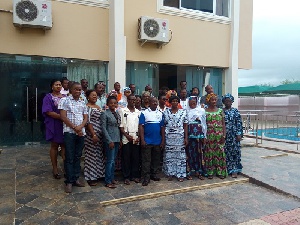The National Peace Council (NPC) has pointed at the failure of traditional councils in the Upper East region to plan how chiefs are to be succeeded when they exit the skin of authority as largely responsible for the recurring wave of violent power struggles in the region.
Even where a succession plan exists, according to the NPC, there is “confusion as to the process”. Some parts of the already-deprived region are yet reeling from the needless loss of lives and belongings incurred sometime ago during violent conflicts, with 7 chieftaincy-related cases from within the region’s 17 paramount traditional areas being heard today by the Upper East Regional House of Chiefs.
Before Bawku became calm through some rigorous peacekeeping efforts, at least 182 people, including women and children, had perished with about 80 houses burnt down after a longstanding chieftaincy conflict exploded again in 2007.
A chief fled his palace on his feet one hot afternoon in a smock when a band of youths, who did not recognise him as a traditional authority, suddenly raided his house and torched some of his rooms in the Kassena-Nankana West District in April, 2016.
Two royal factions in Bolgatanga, the regional capital, are still at loggerheads amid peace brokers’ interventions over a sharp disagreement that has culminated in some irrecoverable damage done to lives and property.
“If you look at the region,” said the NPC’s Executive Secretary for the Upper East region, Ali Anankpieng, “what are the conflicts? One, we have land. Two, we have chieftaincy. And if you talk of chieftaincy, one of the factors is the succession plan. We don’t have any succession plan as to how, if one chief dies, the next one takes over. In most cases, we don’t have it. Where you have it, there is confusion as to the process.”

The Executive Secretary was speaking to newsmen on the sidelines of a workshop organised in Bolgatanga for 30 women and youths representing the Upper East, the Upper West and the Northern regions. The 2-day workshop, aimed at improving the skills of participants in the areas of conflict management and resolution, was bankrolled by the European Union (EU) through the United Nations Development Programme (UNDP).
Chiefs’ interest in land lease also causing conflict
The interest shown of late by chiefs especially in the commercial lease of land to individuals or organisations, a venture the NPC said used to be the preserve of the traditional landowners, was mentioned as another factor brewing conflicts in the region.
“Land has become a commodity for trade. In Bolga for instance, land is now a tradable commodity. People, who originally didn’t claim land, are now claiming ownerships of some lands because of the money they can make out of it. In times past, the tindanas were supposed to be the landowners. Now, chiefs are coming in. So, you have a conflict between the two.
“If you talk of the other types of conflict, let’s say resources. We know what is happening in the Talensi area- the galamsey (illegal mining). That one is a resource conflict. And that has to do with how our resources are managed. For one to go into prospecting of minerals, what is the process? Do they know it? And who are the stakeholders consulted? These things are not properly laid out for people to know how to go about it. And even those who know it would still want to find the easy way out and do the wrong thing,” the NPC’s Regional Executive Secretary remarked.
Mr. Anankpieng wrapped up his media interaction with a recommendation he said could help the region deal effectively with the conflicts confronting it.
“But these are not things that are not surmountable. We can surmount them- by bringing stakeholders together to see how we can go about solving these conflicts. If we want to solve land problems, we need to bring the stakeholders together- the chiefs, the tindanas and people who are interested in using the land for their development so that they would know who to contact when they are looking for land.
“If you are going to talk about the chieftaincy issues, you need to involve the Regional House of Chiefs and the traditional councils, as to how they can design their succession plans so that when one is not there, there is how another person becomes the new chief,” the Regional Executive Secretary stated.
Choice of Participants made a Unique Workshop
Topics discussed at the workshop were nothing new, being all about the early warning signs and ways to mobilise communities for effective conflict management and resolution.

But one thing that made the workshop unique, on the word of the organisers, was how the participants were chosen on purpose.
“This meeting is focusing on women and youth. In the past, it was chiefs, opinion leaders [and] religious heads- who are mostly men. But this time, we are saying that- ei, hold on a bit! It looks as if there is a flaw in our approach.
“A large chunk of a critical mass of our people is often left out. That is the women, who constitute more than 50% of the population, and the youth, who are the most fleet-footed, agile and are ready to move when there is tension, when there is violence. So, this time, we are saying that come on board; let’s discuss what the challenges are; let’s look at the indicators of conflict and find solutions together,” said Afi Yakubu, Executive Director for the Foundation for Security and Development in Africa (FOSDA), who facilitated the training.
A non-profit-making organisation established in 2001 by a diaspora concerned about conflicts in West Africa, FOSDA conducts research and provides training for the enhancement of human security in the West African sub-region.
General News of Monday, 10 July 2017
Source: starrfmonline.com
Lack of succession plans fuel conflicts in Upper East – Peace Council
Entertainment












